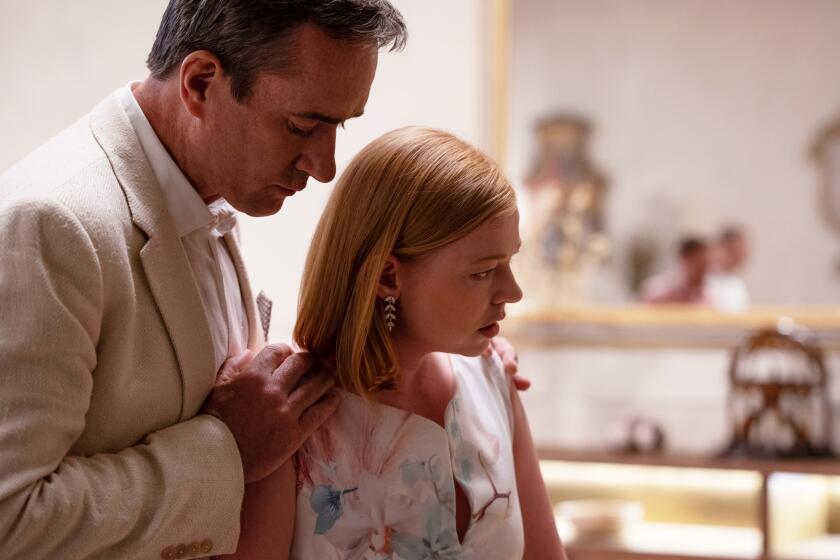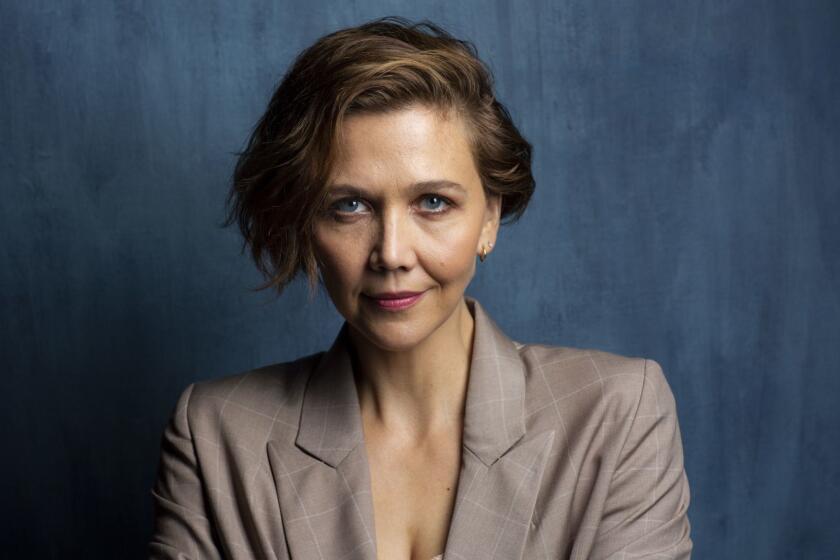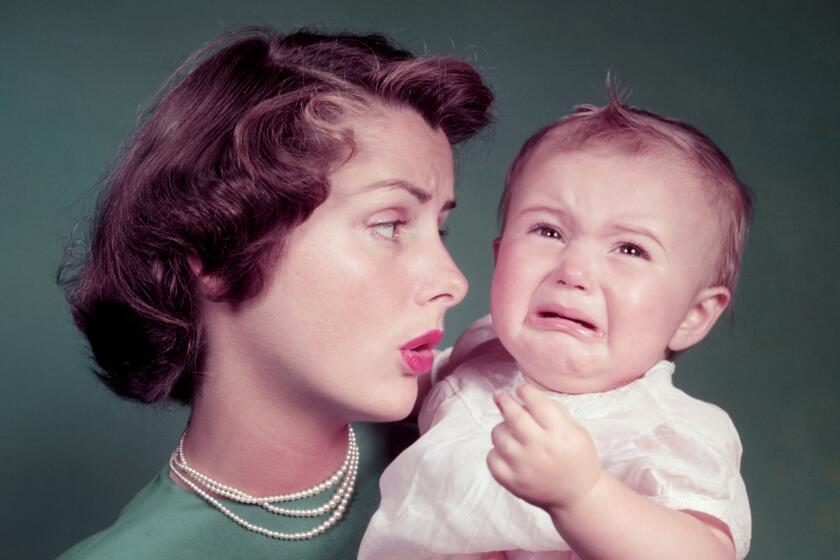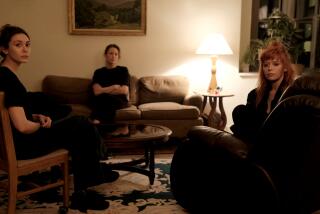Column: ‘The Lost Daughter’ is a film about motherhood that everyone needs to see
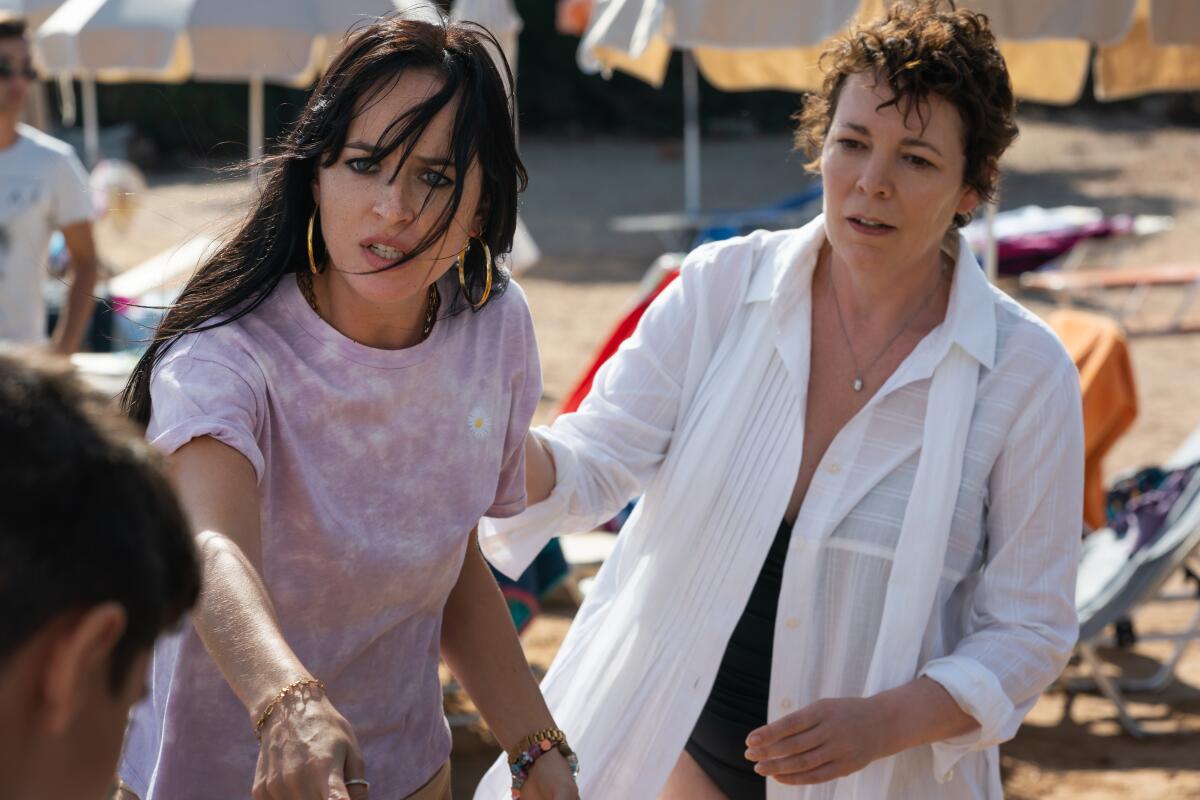
Oscar season is just getting started, but the award for the best line in any movie, possibly ever, goes to Maggie Gyllenhaal’s “The Lost Daughter.”
“Children are a crushing responsibility,” Olivia Colman’s Leda says to a very pregnant woman. “Happy birthday.”
For the record:
2:27 p.m. Jan. 4, 2022An earlier version of this story referred to the beach on which some of the action takes place as Italian. “The Lost Daughter” is set in Greece.
The pregnant woman, Callie (a wonderful Dagmara Dominczyk), has offered Leda a piece of her own birthday cake to apologize for calling Leda a nasty name when she refused to move from her place on a Greek beach to accommodate Callie’s sprawling family.
Swimming in subtext, the line signals the film’s painful but clear-eyed and rigorous exploration of motherhood at a time when motherhood needs all the clear-eyed and rigorous exploration it can get.
What we’ve had instead, at least politically, is pretty much the same old hamster wheel of promises and punishment that have plagued American mothers ever since John Adams neglected to heed his wife’s advice to “remember the ladies.” (He was helping create modern democracy; she was struggling to keep their farm going and their children from dying of smallpox.)
Who could have imagined a year that began with widespread resolve to correct the childcare crisis that forced millions of women out of the workplace (and/or into therapy) during the COVID-19 pandemic ending instead with a full-frontal attack on women’s reproductive rights? Pretty much any woman conversant in American history.
Olivia Colman, Jessie Buckley and Dakota Johnson lead the cast of Maggie Gyllenhaal’s accomplished adaptation of Elena Ferrante’s novel.
Eighteen months of shutdowns, at-home learning and ad hoc after-school care made it very clear that the duties of parenthood still fall overwhelmingly on mothers. Even with kids back in school — though often not to team sports and other extracurricular activities — maternal burnout does not even begin to cover it.
This may explain why a number of this year’s films and shows have addressed the obstacles and ambiguities of motherhood.
From the abuses that Alex (Margaret Qualley) must overcome to protect and keep her daughter in “Maid” to the social strictures that forced Lucille Ball, as chronicled in “Being the Ricardos,” to fight for the right to show her pregnancy on TV, the obstacles are plentiful and obvious.
The ambiguities are just as real but trickier to portray, because they deal with emotions mothers are not supposed to have — much less defend.
“Truth is I should have probably never had children,” Caroline Collingwood (Harriet Walter) tells her daughter Shiv (Sarah Snook) in a recent episode of “Succession,” a jet-setting ode to the nuclear capabilities of parental approval. “You’ve made the right decision; some people just aren’t made to be mothers.”
Caroline says this in surrender; Shiv hears it as a taunt and immediately begins making plans to have the child she never seemed to want — a common tack, alas. The absence of children from women’s lives is too often seen as a lack; women who choose not to have children are often considered selfish, broken or at the very least misguided.
The power of “Succession’s” third season finale was a triumph of serialized storytelling; you can’t pull that kind of rabbit out of a binge.
Mothers who do not devote 100% of the energy to their children often face the same kind of criticism — yes, even in this allegedly enlightened age. As many have chronicled, including Jennifer Senior in “All Joy and No Fun,” virtually every time-saving device or social change that benefits mothers has been countered with a new standard of “good” parenting. (Honestly, if you want to grind your own baby food, that’s great, but it’s not “better.”)
Homemakers remain this country’s largest unpaid and unsung labor force, while women who join the workforce are still viewed with suspicion. (Was there ever a bigger throw-down than the term “full-time mom”?) Parenting is hard, our country goes out of its way to make it harder, and when a mother falls short, even through no fault of her own or only in her mind, she is a bad mother.

No cinematic story has taken on this teeming rats’ nest of myth and need, expectation and exhaustion, love and suffocation more directly than “The Lost Daughter.” Based on a novella by Elena Ferrante, best known for her brilliant and complex chronicle of female friendship in “The Neapolitan Novels,” “The Lost Daughter” looks at the messy humanity of motherhood with the kind of empathetic focus usually reserved for gangsters, serial killers and other antiheroes.
From the moment we meet Leda, alone on a semi-working holiday, we know she is a tangle of self-confidence and self-recrimination, especially in contrast to Callie, whose experience of smug motherhood remains confined to pregnancy. When, in the course of their polite reconciliation on the beach, Callie learns that Leda has two daughters, ages 25 and 23, she suggests their absence might explain Leda’s being out of sorts.
“You need to be with your girls,” Callie says. To which Leda replies, blending frankness, sorrow and fury as only Colman brilliantly can, with a simple declarative sentence:
“Children are a crushing responsibility. Happy birthday.”
I could watch her say that line all day long.
Leda has come to this small beach for some peace and quiet, which is shattered almost immediately by this large family from Queens. Watching Nina (Dakota Johnson) play and cope with her young daughter brings back Leda’s own experiences as a young mother. When the girl goes missing, Leda remembers her own panic in a similar situation and joins the search. Finding the girl, she is drawn into the family, though her interest lies almost solely with Nina, in whom she believes she sees a turmoil similar to her own.
Maggie Gyllenhaal wrote Italian author Elena Ferrante a letter — and then the actor wound up deciding to direct her first feature film.
Flashbacks (in which Leda is played by Jessie Buckley) reveal a serious academic trying to stay sane in a small apartment filled with two young girls and their endless needs. Her love for them is just as true and palpable as her growing feeling of suffocation, but soon, even her daughter’s demand for kisses after she has cut her finger feels like an assault.
Back at the beach, Nina is dealing with a daughter inconsolable over the loss of her doll. In one brilliant scene in a toy shop, we see Nina’s battle with love and frustration as her daughter first puts her hands on her mother’s mouth to keep her from talking, then refuses to be put down, winding her arms and legs around Nina in that limpet choke hold familiar to every mother everywhere.
Leda watches with both sympathy and something else… Connection? Validation?
There may be mothers who have never felt that they were in over their heads — or that the only response to a seemingly impossible situation was to walk away from it — but I haven’t met any. Even the most adorable and adored children are often demanding, unreasonable, clingy and very loud. Different women respond differently and sometimes in ways that are at odds with the myth of motherhood and their own expectations.
Sometimes the sacrifices and accommodations motherhood requires do not become clear until you are up to your armpits in actual children, and sometimes women are simply not able to make them, in the moment or at all.
Leda sees in the other woman, accurately or not, her own attempt to create some space for herself, to hold onto some identity not defined by the ability to comfort a crying child. Like Nina, she was cursed with a husband who was no help at all, and yet the responsibility for what she calls her “unnatural” motherhood falls on her alone.
There’s a good reason the birthrate is declining in California and the U.S.. We’ve made parenthood way harder than it should be.
Neither Leda nor Nina is presented as a role model or even an object of sympathy; Leda’s journey is twisted and a bit inexplicable. (It is not, it must be said, violent or abusive.) But the beauty and importance of “The Lost Daughter” is its ability to hold two thoughts at the same time: A mother can love her children, deeply, truly and need something more from life too. And if a marriage or a society won’t offer her reasonable support, she will sometimes make a desperate choice for survival. Even if that means carrying the weight of that choice for the rest of her life.
But how much better would it be if she just had some help.
More to Read
The biggest entertainment stories
Get our big stories about Hollywood, film, television, music, arts, culture and more right in your inbox as soon as they publish.
You may occasionally receive promotional content from the Los Angeles Times.

